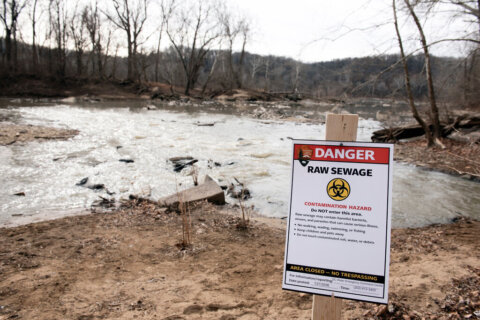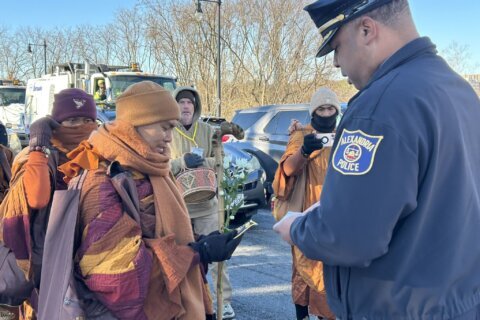WASHINGTON — Members of Congress from Maryland, Virginia and D.C. emerged from a briefing Wednesday with serious concerns about Metro’s ventilation fans and communication during the deadly smoke-filled event.
Multiple members announced that the ventilation on the trains didn’t work properly, even pulling smoke into the trains, a significant claim that has not previously come from officials.
Members of Congress from Maryland, Virginia and D.C. were briefed Wednesday afternoon by Metro officials and the National Transportation Safety Board on the smoke incident that happened south of the L’Enfant Plaza station last week. The briefing revealed several red flags, said Don Beyer, D-Virginia.
“Radios didn’t work, ventilation fans didn’t take smoke out, there were few or no smoke detectors, it took 15 minutes to get a second alarm,” Beyer said at a new conference following the briefing Wednesday.
He went on to assert that the ventilation on the trains actually sucked smoke into the cars.
Acting NTSB chairman Christopher Hart said that third-rail power was not shut off until 35 minutes after the Yellow Line train, number 302, stopped in the tunnel south of L’Enfant Plaza.
He added that “WMATA … has already discovered several items that they feel, based on our investigation thus far, need fixing, and are working on them.”
Among them are changes to procedures around vents inside trains and better labeling of emergency exit doors. During the incident, Fire and EMS workers mistook bulkhead and passenger doors for emergency doors.
“We have tested the ventilation system and noted some anomalies,” Hart said to The Washington Post. “I don’t have details as to what that anomaly is.”
The NTSB has inspected train 302, the train that stopped on the L’Enfant Plaza platform behind it, and the last train to pass through before the incident, Hart said.
Beyer, who represents the home district of Carol Glover, the woman who died, said numerous failures exacerbated the accident, calling Glover’s death “an unnecessary tragedy. So many things went wrong.”
Beyer added that “The ventilation on the trains themselves sucked smoke into the trains,” but sources tell WTOP that that’s not true, that the fans inside the train cars were turned off, which is standard operating procedure for Metro in any smoke incident. The rail operations control center gave the train operator the OK during the incident to shut off the train’s fans.
“We need to make sure that the ventilation systems are working because if they’re not working fully right now, then you could have a situation like this tomorrow,” says Rep. Chris Van Hollen, D-Maryland. “We don’t need to wait to make sure all aspects of the vans and ventilation system were working.”
But on Thursday, Metro will announce new procedures that allow the train operator to shut off the fans without contacting the control center during a smoke emergency.
Hart declined to address potential problems with the fans on the train.
Sources say the fan in the ventilation shaft leading outside the tunnel wasn’t working. Hart says that they’re still investigating. Investigators have been unable to replicate the configuration of the ventilation fans during the accident, and further study is required to determine what went wrong, Hart said.
The fatal accident was the first on the nation’s second-largest rail transit network since a 2009 crash that killed eight passengers and a train operator. Metro links the nation’s capital with the Maryland and Virginia suburbs and carries more than 700,000 daily passengers.
The cause of the electrical malfunction may not be known for months. Members of Congress said they wouldn’t wait that long to demand changes that would make the system safer.
Sen. Mark Warner, a Virginia Democrat, said local fire departments should be required to notify other agencies about changes in their radio encryption. He noted that the government has spent hundreds of millions of dollars to upgrade first responders’ communication networks since the terrorist attacks of Sept. 11, 2001. The upgrades won’t help, he said, if agencies don’t share information.
“Fourteen years after 9/11, we’re still not fully there,” he said.
“We focused on communication, response time,” Sen. Barbara Mikulski, D-Maryland, said afterward. “How could people know what was happening on the car on which they were? Were they trapped? Were they in danger? What could they do to save themselves?”
There aren’t any quick answers to those questions, nor to the questions of why it took long for D.C. firefighters to get to the station, and why Metro workers kept them from entering the tunnel.
Passengers were on the train for 30 minutes before firefighters arrived, and District officials have said problems communicating with Metro led to delays in evacuating the train. The train operator repeatedly told passengers to stay put, but some ignored those instructions and evacuated on their own. Glover, 61, was not taken to a hospital until more than an hour after the smoke was first reported.
WTOP’s Ari Ashe, Dave McConnell and Andrew Mollenbeck and The Associated Press contributed to this report. Follow @WTOP on Twitter and WTOP on Facebook.







